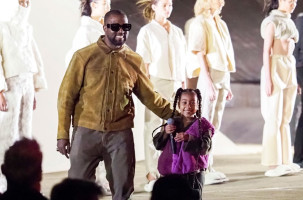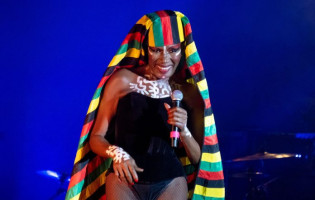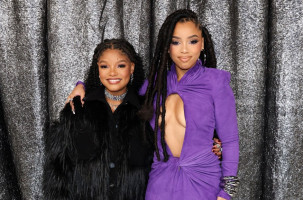Spend any amount of time with Turner's Big Radio & Record Adventure: The Life And Musical Journey Of Dennis Dale Turner, and you will at first be enchanted by the story of an America that was in swift transition. It was the 1960s, and in the heart of the American Midwest, things were changing all over. Technology was becoming much more a part of everyday surroundings and life was spreading from the cities to the suburbs, especially in Dale Turner's native St. Louis, Mo.
"I was a typical kid of the '60s," Turner tells Billboard. "I was boxed in for so many years as a kid in St. Louis. The only way that I got out of that box was my love for radio, and finally getting into it."
As it turned out, Turner's love for radio led to him dropping by local Top 40 station KXOK in 1970 to interview on-air personality/program director Mort Crowley for a college project. That interview didn't take place. However, Turner was asked to apply for a part-time $1.65-an-hour position at the station. He got the job -- and was hooked. That one experience led to a career in radio that included stops in such markets as Little Rock, San Antonio and Memphis before becoming a force at Nashville's WKDA in the late 1970s. From there, Turner was on to Cincinnati -- and then a 27-year run as a record promotion executive for RCA and Lyric Street. Needless to say, he looks back on that day in St. Louis with awe and reverence for the career that he has been able to build.
"All I wanted to do was chat with Mort Crowley and create a paper that would get me through junior college," Turner admits. "To be able to have a chance to work there -- I was on such a complete high when I got that job. I did not know that it was going to help me step into the life I have had, but it did. Serendipity happened that day."
Inside the pages of Turner's Big Radio & Record Adventure, he details each stop along his radio career, including playlists, mentors, co-workers and several of the marketing stunts that helped him in his later years promoting records. At WTHI in Terre Haute, Ind. in 1973, the station manager issued a statement on a Friday afternoon apologizing for comments that Turner had allegedly made on the air. As the weekend moved along, more and more listeners became aware of the controversy around Turner. In fact, it was merely a ploy to bring attention to his morning show. He had said nothing controversial at all.
"That was brilliant," Turner admits. "I wish I could take credit for that, but it was Bob Rouse, my GM, that staged that whole stunt. We got that on television throughout the weekend in the market. If anybody had an Arbitron diary, it just kind of heightened the visibility of the station and my morning show, in particular."

Turner talks of the many radio programmers he met along the way, which were numerous in light of his frequent moves. He was having the time of his life, though it did take a toll on his young marriage.
"I had no fear," he recalls. "I was always willing to hook up the U-Haul, and move to the next market. We had no furniture. We lived in furnished apartments. We had very little physically to haul around. It never occurred to me that this wasn't the way a radio career was built."
Read more: Why a Slow and Steady Climb Endures on Country Radio
He discusses many of his friendships in the industry in the book, and credits the late Les Acree for being one of his biggest mentors.
"He had a great ear for music," Turner says. "He was one of those program directors that wanted to find fresh new talent and not just buy somebody out of a big market. He wanted to develop young air talent, which you don't have much of anymore. He taught me formatics, the proper segues of going from one thought to the next in order to keep your program moving forward and informative, as well as musical [ones]."
There are several encounters with the recording artists that he played on his show mentioned in the book -- from escorting Jerry Lee Lewis around Terre Haute to innocently offering a young Tanya Tucker a drink during her teenage years. (Her father Beau immediately cut in to say, "She'll have a 7-Up.") Those relationships became even stronger when Turner moved to Nashville in the fall of 1976 to work at WKDA under Acree. That job opened his eyes to what would become his second career.
"I had no idea that there were people in Nashville whose job it was to get playlist adds and to get airplay," Turner says. "I was on a quick learning curve trying to deal with a music industry as a radio reporter to the charts. I got up to speed quick, just by looking and observing how Les carried himself. In Nashville, I didn't just have regionals working me, I had the heads of labels right down on Music Row. They were bringing in their new act, or taking me out to dinner to learn what the competition was doing and [to] figure out how the chart game worked. They started asking me for quotes for trade stories and magazine ads. My profile quintupled during that four-year period."
His next stop was Cincinnati, which brought him to a Top 30 market for the first time, and also led to his second marriage to wife Patty, which remains strong to this day. However, to raise a family, he knew a likely career change was in order.
"If I was going to have a family, I couldn't be dragging them around every three or four years when a new job becomes available," he admits. "I thought, 'If there is another area of the music business that I could get into, that might create a little more stability.' That's when [RCA executive] Joe Galante came knocking -- we had struck up a friendship in Nashville. He gave me a chance to work in Chicago as one of his regional reps."
To call his stint at RCA a success would be an understatement: he worked records by Alabama, the Judds and Clint Black, just to name a few. In the following excerpt from the book, Turner discusses working the late country singer Keith Whitley:
"RCA signed Keith to a contract and began to tour him around the country introducing him to radio. I got him in the Midwest early on and made some appointments with radio for them to get to know Keith. A shy, young man met me in the Omaha airport on a Monday morning. We were scheduled to have lunch with the guys at WOW. Chuck Urban, Bill Corey, John Dixon, Rick Fleming and the staff gathered at a local Mexican restaurant. Even though it was lunch, everyone ordered cocktails. In fact, we had big pitchers of margaritas brought to the table and refills after that. It was a successful bonding for Keith at WOW.
"Our next stop was dinner in Des Moines, which was about a 100-mile drive. I looked over to Keith in the passenger seat halfway to Des Moines and he was passed out cold. I had to help him into the room when we got to the Marriott and go on to the radio dinner by myself. Keith and I stopped at the station the next morning on our way out of town. Keith was such a gentle soul, nice as can be and I just wrote it off as nerves. Some artists are great on stage and in the studio but the whole shake and howdy comes hard for them. Little did I know that a couple of weeks later, Joe Galante and his manager Jack McFadden would enter Keith into rehab to help address his issues with alcoholism. To Keith's credit, he bounced back and went on to have huge hits until his untimely death in 1989 ('I'm No Stranger to the Rain,' 'When You Say Nothing At All'). I truly believe that Keith Whitley and Randy Travis paved the way for a return to traditional country music, which kept the door open for artists like Alan Jackson and Clint Black."
STARLIGHTPR: 4 Weeks Premium Next Level Campaign.The Source Magazine, Hip Hop Weekly, Live radio interviews and more.
Just as was the case with radio, Turner had to maintain somewhat of a showman atmosphere with promotion, which sometimes called for extreme tactics. "You had to cut deals and be very creative and sometimes you had to ask for forgiveness instead of permission," he recalls. "You're out there with these radio guys and you are judged on that add sheet. You give yourself approval to do certain things that, in hindsight, may not have been ethical or the right thing to do." Did he -- and others -- cross that line? That can be subjective, he says: "It all depends upon one's definition of 'the line.' In some people's minds, payola was going on. But in others', it was how radio and records did business until someone told us to stop doing it that way."
He is unflinchingly honest regarding his bitterness about being terminated by the label in the late 1990s, which led him to the discovery that he was much more than someone who was associated with a company. "I realized a corporation's name attached to your name gives you some false sense of security, but it absolutely doesn't," he says. "I had to learn that the hard way. I realized that I was a good person and a good record guy, even if I didn't have 'RCA' next to my name."
He found success again -- this time at Lyric Street Records, helping to launch the careers of Rascal Flatts and SHeDAISY, though for each success the label had with those artists, there was a Sonya Issacs, Brian McComas or Sarah Buxton that fell through the proverbial cracks.
"RCA had such big successes that it kind of hid the artists that didn't make it through the system; a Robert Ellis Orrall or a Pake McEntire. We had our share of them [at Lyric Street]," he says. "But we were so overwhelmingly dominant through the '80s, and with Lyric Street it seemed more painful when they didn't work out."
Still, launching Lyric Street -- a Walt Disney-owned company -- did provide a new high. "We had to start from ground zero," Turner remembers. "That was hard for me: How are we going to compete with the big boys? We used our resources at Disney to help brand us not only as Lyric Street, but as a Disney company doing country and being a major competitor. We really had to roll our sleeves up, get out there and pound the pavement at radio."
Lyric Street shuttered in 2010, and though that came as a shock, Turner now looks back at it with another set of emotions.
"When technology took over of the charts, that's when promotion stopped being a relationship business," he explains. "Everything was real-time spins. The way you had to achieve chart share and success became so much more different... It became tedious to me. I thought, 'This is for a much younger person with a lot more drive.' It was time for me to hand off the baton."
Since 2012, Turner has been in semi-retirement, doing morning radio for WDKN / Dickson, a station in the Nashville market. He says that finishing the book has given him a chance to relive his past, celebrate his successes and look back on his failures -- his first marriage and his son's substance abuse issues are two regrets -- and what he has learned along the way.
"I'm glad it's done," he says about the book. "It's been a labor of love, but I took much longer to write it than I thought it would take. The book gives me a sense of closure. I can now retire and enjoy my grandkids, do some traveling off the bucket list. The book was therapeutic for me, very much so."
Turner plans to set up a book tour in markets where he has previously worked and has pledged half of his royalties from sales to St. Jude Children's Research Hospital in Memphis. The book is available through Amazon.com and Createspace.com. For more information, visit TheDaleTurner.com.








